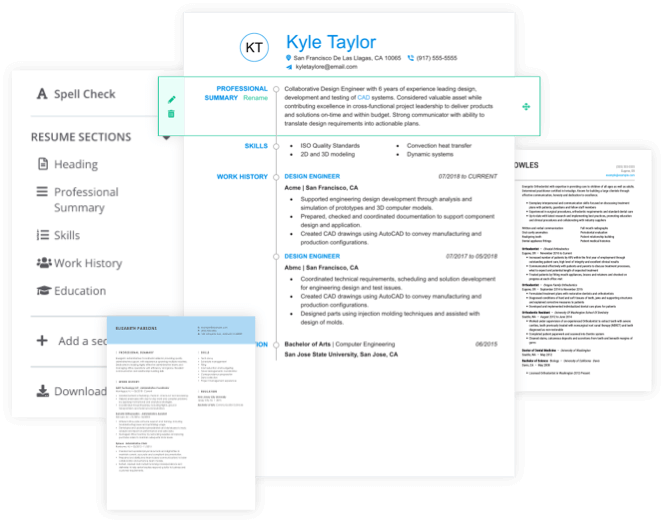- Featured in:

It is up to an HSE engineer to ensure that all occupational health and safety standards are followed and that adherence to environmental laws is maintained in industrial or manufacturing settings. HSE engineers devise safety plans, monitor practices to ensure compliance, write up safety policies and procedures, and respond to emergencies as needed. They also review the impact an industry has on the environment and create plans to minimize or eliminate any impact on a company's surroundings.
These engineers can work in the oil and gas industry or for waste management plants, construction companies, utility companies, or consulting firms. HSE engineers collaborate with managers, safety leaders, inspectors, and other professionals, and they split time between an office and the field. They work full time and occasionally work longer hours when handling an emergency or crisis situation.
Need cover letter guidance? Add a cover letter to your resume using our cover letter formats how-to guide and add value to your resume.
Improve your application with a personal message! Your resume may summarize your qualifications, but a cover letter can help you express your professional accomplishments and working style. Pair these cover letter templates with our builder subscription to unlock AI-powered text templates and professional designs that will help you submit a complete application.
HSE Engineer Duties and Responsibilities
Create Safety Policies and Plans
HSE engineers develop safety policies to minimize risks, outline safety procedures, and ensure regulatory compliance with federal occupational health and safety laws and regulations. They explain how to prevent accidents, implement safety plans, and respond to emergencies. They also use knowledge of environmental laws and regulations to review company practices and devise processes to address the impact of a company's practices on the environment.
Generate Safety Issue Reports
It is up to HSE engineers to detail accidents and safety issues within an occupational setting. They work with managers, OSHA representatives, and other personnel to investigate incidents, offer solutions, and follow up to ensure that the issue leading to the incident has been addressed and corrected.
Conduct Safety Audits
HSE engineers lead safety audits to identify possible hazards and address potential accidents. They work to resolve issues revealed by these audits and cooperate with OSHA inspectors to do so.
Oversee Safety Training
In this role, HSE engineers lead safety training programs for employees. They explain health and safety laws and regulations, detail safety procedures, discuss preventative strategies, and address employee concerns.
HSE Engineer Skills and Qualifications
Are you an analytical individual? Do you possess strong organization and leadership skills and work well in a team? Do you care for the safety of workers and the environment? Based on our study of various online job postings, you'd meet the expectations of most employers, who look for the following skills and abilities:
- Computer skills – it is helpful for HSE engineers to possess strong skills in areas of word processing, presentation applications like PowerPoint, and various programs such as incident reporting and environmental management software
- Technical skills – a thorough understanding of electrical safety, equipment lockout, machine safeguarding, and industrial machinery operations is crucial for HSE engineers
- Project management – team building, estimating, and scheduling are top project management skills that should be displayed by HSE engineers
- Collaboration – from OSHA inspectors to safety leaders, HSE engineers must work with other professionals to create a safe environment for workers
- Eye for detail – HSE engineers must be able to spot potential hazards, identify safety concerns, and recognize practices that could harm the environment
- Analytical thinking – analyzing regulations, compliance guidelines, safety practices, audit reports, and other documentation is a must for these engineering professionals
- Problem-solving skills – HSE engineers review safety issues and possible environmental impacts and offer real solutions to prevent accidents and injuries and address environmental concerns
- Communication skills – producing clear and concise reports, leading training classes, and speaking with federal officials such as inspectors and auditors calls for strong verbal and written communication skills
HSE Engineer Education and Training
To start in this field, candidates first need to obtain a bachelor's degree. Most employers require a four-year degree in occupational health and safety or environmental science. Applicants can also possess a bachelor's degree in industrial engineering, systems engineering, or mechanical engineering. These programs should combine classroom studies with labs and field experiences. Completion of an OSHA training program can be helpful.
HSE Engineer Salary and Outlook
HSE engineers earn a median annual wage of $88,500, according to the Bureau of Labor Statistics (BLS). HSE engineers in the lowest 10th percentile make about $52,000 annually, while top earners realize a yearly salary of more than $139,000.
HSE engineers working in the petroleum and coal product manufacturing industry and in oil and gas extraction make the highest annual mean wages in the US, at about $114,000 and $113,000, respectively. At nearly $110,000, HSE engineers working in New Mexico make the highest yearly average wage, followed by those in Texas (just over $108,000) and California (nearly $107,000).
The BLS projects a 9 percent increase in employment for HSE engineers through 2026. The expected creation of new safety and health regulations and the need to ensure worker safety as industrial processes change are believed to be major factors in this employment growth prediction.

Helpful Resources
American Society of Safety Professionals
since 1911, ASSP has provided various safety professionals, including HSE engineers, with educational and career development opportunities. Formerly known as the American Society of Safety Engineers, ASSP offers online learning and conferences, information about safety standards, continuing education, and news articles relevant to the field
Safety, Health, and Environment
how do you recognize potential safety hazards? What is the best personal protective equipment (PPE)? What are key terms in safety, health, and environmental engineering and related areas? These are just some of the topics you'll learn about when you refer to this comprehensive book
Industrial Safety & Hygiene News
ISHN is an online publication offering product reviews and news, as well as articles addressing safety in the oil and gas and construction industries. Learn more about government regulations, safety standards, industrial hygiene, environmental health, and personal protective equipment
EHS on Tap: The Podcast for EHS Professionals
safety culture. Risks of non-compliance. OSHA recordkeeping. Overcoming safety challenges. The future of EPA regulations. Hear industry experts discuss these types of subjects in free podcasts
International Journal of Safety and Security Engineering
though a bit technical, you can download free papers about environmental protection, safety systems, prevention practices, risk analysis, emergency response, and public safety
Safety + Health
the official magazine of the National Safety Council (NSC) Congress & Expo, Safety + Health features detailed articles about training, regulatory practices, PPE reviews, safety tips, and much more
Safety Engineering: Principles and Practices
from emergency response planning to inspection preparation, this book covers the professional practices and duties of all those involved in health and safety, including HSE engineers. You'll review OSHA standards, federal regulations, noncompliance issues, and more




